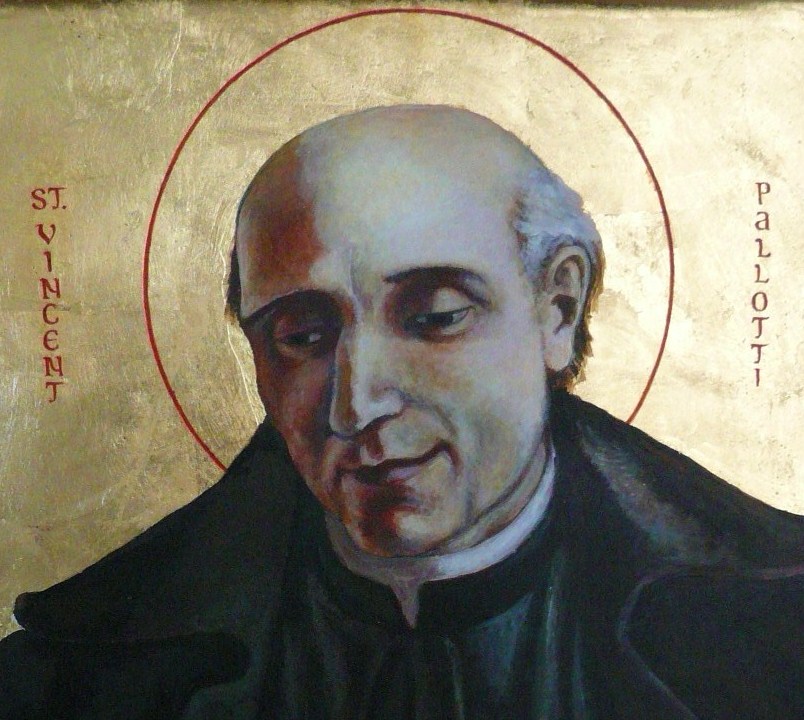Saint of the Day – 22 January – St Vincent Pallotti (1795-1850) Priest, Missionary, Founder of the Pallottine Fathers and the Pallottine Missionary Sisters, Marian devotee, Apostle of Charity and Evangelisation – known as “second St. Philip Neri.” (21 April 1795 in Rome, Italy – 22 January 1850 in Rome, Italy from a severe cold (he probably caught the fatal illness on a cold rainy night when he gave his cloak to a beggar who had none). St Vincent was the founder of the Society of the Catholic Apostolate later to be known as the “Pious Society of Missions” (the Pallottines). The original name was restored in 1947. He is buried in the church of San Salvatore in Onda. He is considered the forerunner of Catholic Action. Patronages – the Pallottines and Catholic Action and is the principal patron of the Pontifical Missionary Union of Clergy.

St Vincent was an Italian ecclesiastic, born in Rome of a noble family. This unpretentious man, Saint Vincent Pallotti, who out of respect for God omnipresent always went bareheaded, is one of the glories of the Catholic clergy, the pillars of the Church in troublesome times and the successful apostles of the people.
From earliest childhood he evinced tender love for the Blessed Mother of God and the decree on the heroic nature of his virtues emphasises the following facts: “He possessed an exceptional love for poverty and penance and was therefore especially devoted to St Francis of Assisi. Because various obstacles were in the way of his entering the First Order, he desired at least to belong to the Third Order. It was his constant endeavour to imitate and venerate St Francis.” Vincent became a Tertiary in the Franciscan church of Aracoeli on 29 November 1816. 
A contemporary of Cardinal Newman’s and the Cure of Ars’, St Vincent Pallotti was a very modern saint who organised so many remarkable pastoral programs that he is considered the forerunner of Catholic Action. He was a man of great ideas and great vision and was able to inspire others to tackle great things. He is the founder of the Pallottine Fathers and the Pallottine Missionary Sisters; however, this was but the tip of the iceberg of his accomplishments. He left behind schools, guilds and institutes that carried the Catholic mission into the very heart of contemporary society.
He was born in Rome in 1795 and began studies for the priesthood very early. Although he was very bright, he was not attracted by studies, even though he was ordained a priest at twenty-three and earned a doctorate in theology soon afterward. He was given an assistant professorship at the Sapienza University but resigned it soon after to devote himself to pastoral work. With prayer and penance, with his labours in the pulpit and the confessional, with his efforts on behalf of the sick and the endangered and especially on behalf of young clerics in the Roman seminary, he did a measureless amount of good. During the cholera plague in 1837, Pallotti constantly endangered his life in ministering to the stricken. In fact, it is well known that the saint often bi-located so as to be able to reach more souls when necessary.

Before long, his zeal was known all over Rome. He organised schools for shoemakers, tailors, coachmen, carpenters and gardeners so that they could better work at their trade, as well as evening classes for young farmers and unskilled workers. He soon became known as a “second St. Philip Neri.” He gave away his books, his possessions, and even his clothes to the poor and once dressed up as an old woman to hear the confession of a man who threatened “to kill the first priest who came through the door.”
In 1835, he founded his two congregations and was instrumental in the founding of a missionary order in England and several colleges for the training of missionaries.
On 14 January 1840, St Vincent celebrated Mass before the miraculous image of the Mother Most Admirable at the convent of Santa Trinitá dei Monti. As he was leaving, he told Mother Makrina, a Russian Nun, that this would be the last Mass he said there. Two days later he took ill at the home of James Salvati. He was diagnosed with pleurisy. Giving away his cape to a cold pauper during the Octave apparently brought on the illness. Thin cassocks just aren’t warm enough in January, even in Rome.
St Vincent’s death was the kind of death we should all pray to have. He received the Last Rites, reciting the words with the priest administering it. He blessed his little community and encouraged them to perseverance. “Do you know what a beautiful feast there is tomorrow? It is the wedding feast of the Mother of God, and there will be great joy in heaven tomorrow.” He was referring to the Feast of the Espousals of our Lady on 23 January of special significance to him because he was mystically wedded to that great Spouse. His spiritual sons tried to induce him to stay in this life, after all, he had cured so many others. “My God, my God! Please, please, let me go, to wherever God wills!” he said. He fell further into the bed and repeated, “Please, please, let me go, to wherever God wills!” Half an hour later, after once again receiving sacramental absolution, he died.
He was only fifty-five but God glorified His humble servant by the gift of miracles both during his lifetime and after his death in 1850. There was a strange and marvellous scent, a heavenly perfume, that was noted about the saints body and in his room at the time of his death. That scent lingered in the room in which he had died for a month, even through the window to the room was left open. St Vincent Pallotti was comparatively young when he was called to eternity, but in that short span he had accumulated a wealth of merits. He was beatified in 1950 and canonised by St Pope John XXIII in 1963.
The body of Saint Vincent Pallotti was exhumed in 1906 and 1950, and his body was found to be completely incorrupt. His body is enshrined in the church of San Salvatore in Onda, in Rome, where it can be seen.
During the Christmas Season, a nativity scene that Saint Vincent made himself is put on display at the Vatican, in the Basilica’s square, before the Christmas tree. Vincent promoted the celebration of the Octave of the Epiphany as an act of unity with his Orthodox brethren who celebrated Christmas on that day.











































































You must be logged in to post a comment.